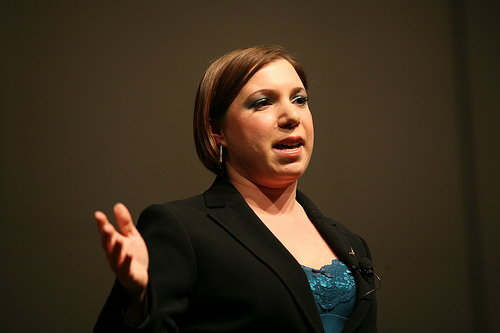
Catholic MP blasts “awful” British immigration policy at J&P Conference
“Many asylum seekers in Britain are at near destitute levels because the government doesn’t want to be seen to be soft on asylum seekers,” Sarah Teather MP, chair of the All-Party Parliamentary Group on Refugees, told the annual gathering of the National Justice and Peace Network on Sunday. The ban on asylum seekers working is just one of the government measures she says has forced many into severe poverty. The Lib Dem MP for Brent Central also described as “awful” Britain’s block on refugees from Syria being given sanctuary here. “Just 50 refugees from Syria have been resettled in Britain from Syria, and there are only 4,000 Syrian asylum seekers”, she said; “meanwhile, 2.8 million people have been accepted into countries neighbouring Syria, such as Jordan”, which she visited last November. “Fear of public opinion has prevented the British government from doing anything more” she added, pointing out that dangerous trafficking, particularly in the Mediterranean region, “is a consequence of our failure to provide a safe route for resettlement”.
Speaking of her first surgery as a new MP 11 years ago, and picking up on the theme of the conference, ‘Called to Life in All Its Fullness: accepting the responsibility of our baptism’, Sarah reflected that, “I was baptised with water but my constituents baptised me with fire”. That first surgery, she described the transformational experience of hearing stories of people who were struggling for justice. The plight of three women refugees from Bosnia, who had been raped during conflict there and were hiding in the UK, struck her particularly forcibly. “It was a conversion experience for me” she said “and I had no idea so many people lived in a kind of limbo”. She admires the “quiet dignity” of refugees and asylum seekers she has met since that time. She was very pleased that campaigning to end the detention of children in Immigration Removal Centres was eventually successful last year, and she told the conference it was “nourishing for me to meet people campaigning on these unpopular causes”. She advised J&P campaigners to take the view that politicians too can hear God’s voice, and with positive support “they are more likely to take the courage to lead”.
Around 300 participants warmly applauded three other speakers as well, who all addressed the mission to the vulnerable. Clare Dixon, Head of CAFOD’s Latin America Desk, spoke to the theme of prophetic witness in Latin America, highlighting famous ‘prophets’ such as Dom Helder Camara of Brazil and Archbishop Oscar Romero of El Salvador who believed in the ‘preferential option for the poor’ and found themselves ostracised because of it. She pointed to Pope Francis being formed by the inspirational Church of Latin America to say that “we want to have a poor Church and for the poor”.
Mary Colwell, the producer of Shared Planet on BBC Radio 4, called for concern for the common good to include God’s creation. She quoted eco-theologian Thomas Berry who said that humanity has broken “the great conversation with Earth” and urged that “we must start talking again, and listening”. Speaking over constant thunderclaps in one of the biggest storms seen in Derbyshire in recent years, she said, “I know I am preaching to the converted when I say it is being true to our baptism to care for the life and landscapes that make up planet Earth”. She urged the J&P activists to “keep talking about it, work for it, love it, enthuse people about it, write letters of complaint when things are wrong, write letters of praise when organisations or governments or church leaders act”.
Gemma Simmonds CJ, Senior Lecturer in Pastoral and Social Studies and Theology at Heythrop College, talked about the priesthood of all the baptised, focusing on the layperson as bridge builder, healer, and consecrator of ordinary things that through their service are transformed into effective signs of grace. “It is a disembodied theology that doesn’t make sense of, or links with, ordinary life” she said. Former chair of the Methodist conference, Revd Ruth Gee, part of the all-woman line-up of keynote speakers, agreed that “the sacred is everywhere in everyday life” and she concluded the conference by encouraging ecumenical collaboration: “In working towards the kingdom, we can do it best together”.
Sixteen workshops covered topics such as Prison Ministry, Water, New Economics, Ethical Investment, Poverty in Britain and Human Trafficking. ‘Palestine: Time for Action’, led by Pat Gaffney of Pax Christi and Ann Farr, who has worked as an Ecumenical Accompanier in Palestine/Israel, inspired a packed prayer service for Gaza on the Saturday evening. Thirty stalls of resources attracted visitors in between sessions. More than 50 young people at the conference pledged to build a better world in the concluding liturgy and the smallest children sprinkled water over the congregation in a liturgy calling everyone to take responsibility for social and environmental justice and peace.
Cardinal Peter Turkson, President of the Pontifical Council for Justice and Peace, said in a message to the conference: “I am certain that this annual conference of the National Justice and Peace Network in England and Wales will encourage all Christians to take up the task of evangelising, to enrich the world through their testimony of faith in Christ, and to join hands in collaboratively and fruitfully promoting the common good, respect for every human person and care for our home – Earth.”
By Ellen Teague



